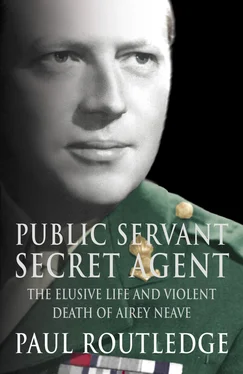Then, a brutal return to reality. Neave had gone left, not right, to the guardroom with the other German soldiers. And the NCO was not sure about his face. He looked again at the disc. It was the Number 26 about which he had been warned. According to Eggers, the sentry yelled ‘Halt!’, but ‘Number 26’ walked on. Other guards joined in the shouting, but ‘Number 26’ merely quickened his step.
Neave tried to ignore the shouts but then committed a fatal error. He turned round, and in the arc lights the painful inadequacy of his comic opera costume was plain for all to see. The scenery paint on his tunic and the forage cap of which he was so proud glowed in the artificial light. ‘I was a figure of the underworld, a demon king under the spotlights in a Christmas pantomime,’ as he later confessed. 11 Neave turned back and ran towards the archway and the bicycle that was to take him to freedom. But from the archway came a second, firmer voice: ‘Halt, or I fire.’
Realising that further resistance was pointless, Neave turned back again towards the guardroom and put his hands in the air. The archway guard stuck a rifle in his back and all the soldiers in the guardroom gathered round in great excitement, shouting, gesticulating, waving rifles and revolvers as if caught up in a major military incident. One Unteroffizier , enraged at Neave’s audacious impersonation, screamed: ‘This is an insult to the German army! You will be shot!’ The mayhem died down with the arrival of the Kommandant, Oberst Prawitz. The impeccably dressed Prawitz looked Neave up and down disdainfully, took in the details of his amateurish uniform, remarked on the impertinence of the escape bid and ordered that he be taken away to the cells.
Chaplain Platt argued that Neave’s failure lay not in his comic opera uniform but in the way he behaved in trying to escape. Once outside the gates, the German guards stood about waiting to fall in and march back to their quarters. ‘Neave couldn’t possibly do that,’ Platt wrote in his diary. ‘His only hope for success lay in an unobtrusive disappearance from the immediate scene, and then to walk rapidly down the causeway to the outskirts of the village.’ Alas, his quickstep departure aroused suspicion. Neave had not made sufficient distance to warrant making a hit-or-miss dash for the open country, Platt commented. ‘There wasn’t a chance in a million that he would get twenty yards without being shot. So failed a very worthy effort.’ 12
In the cells Neave was thoroughly searched – ‘more thoroughly than usual’ according to Eggers. They discovered the Cellophane container stuffed with money, which was a disconcerting find. It showed that the prisoners had access to German currency, an invaluable aid to escaping. Neave was led roughly away to solitary confinement, where he took off his makeshift cardboard belt and wooden bayonet and hurled them to the floor in a fit of temper. It was hours before he could sleep. Years later, he would reflect on his dejection at being caught, on his fall from self-made hero to a sad joke in a burlesque German uniform. Perhaps he was too hard on himself. It was not his uniform that had given him away, nor necessarily his behaviour, but the brass disc that the British contingent had coaxed out of the civilian painter. Had they copied the disc, and engraved a different number, the ruse might have worked. Even so, and as Chaplain Platt observed, Neave had not thought through his tactics after getting over the first big hurdle, the castle gate. His passion for flight was the rage of youth. He was still only twenty-five, perhaps older than his years but still lacking in a strategic grasp of the science of escape. Neave had proved he could get out of Colditz, but not clear away from Nazi Germany. Being a loner was his nature, and it was not enough. It never would be. He needed others, allies with a greater instinct for the long range.
In the morning after his failed bid, the guard brought him the usual ersatz coffee. Gravely, he warned Neave that he was about to be court-martialled and shot. Neave snorted with derision. He was no longer afraid. He felt only foolish and unaccountably ‘liverish’. Later in the morning, he was frogmarched to the Kommandant’s headquarters, where in a formal, wood-panelled gallery, he was inspected by Colditz officers one by one. The reactions to his uniform varied from derision to wrath. Kommandant Prawitz ordered him to stand to attention and salute, German fashion. Neave was beside himself with rage and made a poor show of a German salute. Prawitz ordered him to do it again, this time properly. The other officers sniggered and Neave saluted again. It was a humiliating experience. He was made to stay in the gallery, under guard, for the rest of the morning. From time to time, police officers from the village and soldiers came in to gape at him as if he were an exhibit in a zoo. Then, an elderly photographer from the town was brought in to take his picture. Neave posed for the camera, perspiring profusely beneath his lurid uniform. ‘I had reduced all escaping to a ridiculous farce, a music-hall turn,’ he raged. ‘I grew crimson with mortification as the old man doddered about the gallery exchanging feeble jokes with the soldiers. It seemed hours before the comedy was over.’ 13 The photograph he took survives to this day and it does Neave more credit than he realised at the time. He stands, half at ease, left arm behind his back so that the scabbard for his ‘bayonet’ is clearly visible. He stares coolly at the camera and it is impossible to imagine him thinking anything but: ‘You may have got me this time, but there will be another.’
After the embarrassing charade of being photographed, his fake uniform was removed, thereafter to take pride of place in the Kommandant’s personal museum. The threat of court martial for impersonating a German officer was quietly dropped. Instead he would serve the customary indignity of imprisonment in the town gaol when a cell became available, there being constant pressure on accommodation due to frequent escape bids.
Neave’s humiliation was not complete. At the evening roll-call, Hauptmann Priem, the officer to whom Neave was supposed to be taking a message during his escape, announced to the crowded courtyard: ‘Gefreiter Neave is to be sent to the Russian Front.’ Everyone joined in the laughter. ‘It was friendly towards me,’ recalled Neave, ‘but it was not music to my ears.’ Eggers remembers the incident slightly differently, recording that Priem announced: ‘Gefreiter Neave is posted to the Russian Front.’ Eggers also recalled: ‘There was an almighty roar of laughter. Lieut. Neave looked very rueful. Six months later, though, he had the last laugh.’ 14 Following Neave’s daring bid, the camp authorities tightened security. All escapers and new arrivals were subject to mouth and body – i.e. rectal – examination. All military personnel had to carry a printed pass, signed and stamped by the camp adjutant, which was to be shown to all sentries. However, not even the German guards observed such Teutonic thoroughness. They were often too deferential to higher ranks and the rule was never completely observed. Roll-calls, too, were extended, and a new system of counting introduced to make deception harder.
Before the year was out, Neave was caught once again, this time in the Polish orderlies’ quarters on top of the old sick bay when he should have been in bed. German guards who picked Neave and a fellow prisoner up on the night of 23 November assumed, wrongly, that the miscreants were helping an escape bid by two Canadians found on the roof. Chaplain Platt noted enigmatically in his diary: ‘Actually, they were pursuing interests of their own.’ They were thrown into the Schloss prison, but, gaol space being at such a premium, Neave was locked in an unheated double cell with two fellow officers. Their cigarettes were confiscated and ‘they thought themselves to be holy innocents exposed to the harsh winds of a cold, hard and unjust world’. They determined on a protest notice, which read ‘ Achtung! Dieser Tat ist eine Schandtat ’ (Attention! This is a scandal). Reasoning that it was of little use to write out so high-minded a notice unless it could be suitably displayed, the trio picked the lock of their cell door, pinned the notice at eye level on the outside, then locked themselves in again and went to sleep. Episodes like these, amusing though they were, drove the German guards to despair.
Читать дальше












